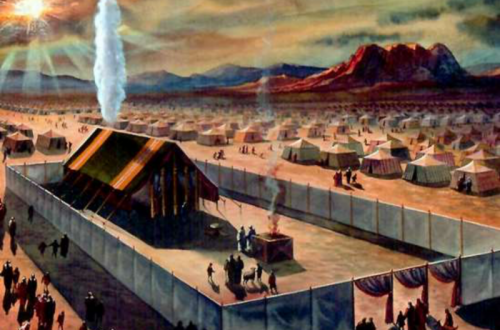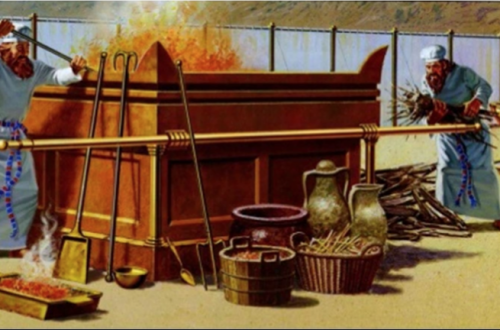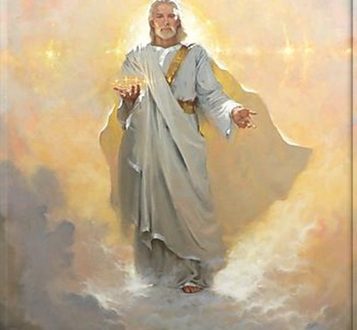Saul, a leader of squandered potential
Title: Saul, a leader of squandered potential
Aim: To follow God’s guidance in choosing leaders.
Scripture: 1 Samuel 9:1–2; 10:17–26
The worsening situation in Israel, 1 Samuel 9:1–2
In Samuel’s old age, he appointed his sons to be judges over Israel. Yet, unlike their father, who was a great prophet and leader, these men proved to be greedy (1 Sam. 8:1–3).
The sons not only accepted bribes but also perverted justice. In response, the leaders of Israel met at Ramah to discuss the matter with Samuel. They demanded that he give them a king like all the other nations had (vv. 4-5).
Samuel was upset by the request of the people, and so he prayed to the Lord about the matter. God revealed that the Israelites’ demand for a king was a rejection of His rule over them (vv. 6–7).
Ever since the Lord had rescued the Israelites from Egypt, they continually abandoned Him and followed pagan deities. God told Samuel to fulfill the people’s request and warn them about how a king would treat them (vv. 8-9).
Samuel told the Israelites that a king would draft the nation’s young men into his army and conscript slave laborers for his building projects. Such a king would take the best of the Israelites’ fields and vineyards and use their property for his personal gain. Also, the king would demand a tenth of his subjects’ harvest and flocks (vv. 10-18).
Tragically, the people refused to listen to Samuel’s warning. They still wanted a king so that they could be like the pagan nations surrounding them (vv. 19–20).
The Israelites’ goal was to have a human ruler who would govern them and lead them victoriously into battle. When Samuel told the Lord what the people had said, He in turn directed His servant to follow their request (vv. 21-22).
Saul was God’s answer to the demand of His people for a king. Saul’s impressive height and good looks would make him appear to be a suitable candidate. Yet, as Scripture reveals, Saul was a tragic figure, one who eventually failed both God and the Israelites in his duties as the nation’s first monarch.
Saul’s father, Kish, was an influential man from the tribe of Benjamin. Kish may have been a wealthy landowner and leader in the community.
We find the family history listed in 9:1. Saul fit the description of the sort of ruler the Israelites wanted. His striking appearance suggested that he would make a great monarch (v. 2).
The selection of Saul, 1 Samuel 10:17–26
The narrative indicates that Saul and his servant searched for Kish’s lost donkeys in the hill country of Ephraim and the territory of Benjamin. They also went to Ramah and sought the help of Samuel the prophet.
While Saul was there, Samuel anointed him as the first monarch of Israel. Samuel then called the nation together at Mizpah to tell them the Lord’s choice for their king (9:3–10:16).
Mizpah was a city in the northern part of the territory of Benjamin. Mizpah is mentioned in the account of the concubine who was raped and murdered at Gibeah (Judg. 20:1, 3; 21:1, 5, 8). Mizpah was also important as a place of sacred assemblies during the judgeship of Samuel (1 Sam. 7:5-12). The town was one of his main centers of activity (v. 16).
The fact that the Lord allowed the Israelites to have a king was in keeping with their situation. During the days of the judges, Israel had been a loose knit confederacy of tribes that had never needed to unite against an enemy.
Nomads like the Midianites had made occasional attacks, and Canaanite city-states had sporadically tried to subdue their Israelite neighbors. Yet, local rulers, such as the judges, had been able to deal with such crises.
The Philistines, however, posed a different problem. They had a monopoly over iron and used superior weapons. They also were more united than the Canaanite city-states.
So, the Philistines could gain control of the southernmost region of Judah, the plain of Jezreel, and the coastal plain. They also terrorized the Israelites in the hill country.
At that time, Samuel was the only prominent Israelite leader. Yet, he had become elderly and was not a warrior. In addition, as noted earlier, his sons were corrupt and disliked by the people. The nation desperately needed someone who could unite the tribes and lead them against their powerful enemy.
Saul had several qualifications for being such a ruler. He seemed imposing, given his exceptional height and good looks (9:2). Like the judges, he displayed dynamic qualities. For instance, the Spirit of the Lord took control of him from time to time (11:6-7). Saul also had several unusual religious experiences, like the roaming bands of prophets (10:10-13).
Another factor was the family history of Saul. His being from the tribe of Benjamin may have calmed intertribal jealousies, for Benjamin was not large and powerful like some of its neighbors. Ephraim would not readily have supported a leader from Judah, and Judah would have rejected an Ephraimite king.
At Mizpah, Samuel reminded the Israelites that God was their true King. He had rescued them from slavery in Egypt and enabled them to conquer and settle in the promised land. The Lord had also repeatedly delivered His people from the hands of their oppressors during the period of the judges (v. 18).
Despite the past faithfulness of God to His people, they still demanded a human king. The issue was not so much the request as it was the people’s unappreciative attitude. In demanding a human ruler, they had rejected God’s kingship (v. 19).
The Israelites mistakenly thought that a monarch would save them from “disasters and calamities.” They failed to realize that they were to blame for these troubles, because they had forsaken the one true God and followed pagan deities. If the people continued choosing idolatrous ways, no monarch could shield them from God’s chastisement.
Samuel did his best to help the people understand the basic spiritual issues that were at stake on this momentous occasion. God had confirmed to Samuel that he should anoint Saul. Yet, at the same time, the Lord wanted Samuel to declare that the Israelites could not escape judgement if they disobeyed the Mosaic Law.
Samuel began the selection process by calling the tribal leaders together before the Lord. The tribe of Benjamin was chosen, possibly by casting lots or by using the Urim and Thummim (v. 20). These were apparently two plates or flat stones carried by the high priest.
The way the Israelites made their choice may seem like luck, but it was really the exact opposite. God remained in full control of the situation and oversaw what took place.
Next, out of all the clans belonging to the tribe of Benjamin, the Matri’s family was selected. Finally, Saul son of Kish was chosen from among them. Oddly enough, when the people looked around for Saul, it appeared as if he had vanished (v. 21).
Rather than come forward, Saul hid himself among the “supplies” (v. 22). This may have been a secluded place in the camp where the military provisions, cooking equipment, and food were kept.
Saul’s hiding place worked so well that a search party was unable to find him. When the people asked where they could find Saul, the Lord disclosed Saul’s location.
Why did Saul hide? Some say this reflected his modesty. Others, however, think Saul was filled with hesitancy and self-doubt over becoming the new king of Israel.
In either case, it’s clear that Saul already knew that he was the one whom the Lord had appointed to be the leader of His people (10:1). This was an awesome responsibility, one requiring humility, patience, wisdom, and courage. Even if Saul felt inadequate, he could count on God’s help to succeed as king.
With the information given by the Lord, the people found Saul and brought him out for the public to see. As previously noted, he was an impressive figure, standing head and shoulders above anyone else (v. 23).
Though Samuel had his misgivings about the Israelites’ desire for a king, he submitted to God’s will in the matter. The phrase “the man the Lord has chosen” (v. 24) indicates that God ultimately was the one who had selected Saul to be the nation’s first monarch. This is true even though the Israelites had insisted on having a king.
In ancient times, pagan kings were considered gods who made their own laws and had to answer to no one. In contrast, God appointed Israel’s monarch, who in turn was accountable to the Lord for the ruler’s conduct.
The Mosaic Law outlined the specific regulations for the kings of Israel (Deut. 17:14-20; 1 Sam. 8:11-18). This information is possibly what Samuel shared with the people. He also wrote it down on a scroll and placed it before the ark in the tabernacle (1 Sam. 10:25). This document would serve as a reminder of the rights and duties of the king.
Saul went back to his home in Gibeah (v. 26), where the Spirit of God had previously come upon him (10:10). Gibeah, which was located just three miles north of Jerusalem, served as the first capital of the Israelite monarchy.
How dramatically Saul’s life had changed! One day he was on a mission to find his father’s lost donkeys (9:3). Then after he met Samuel, the prophet anointed Saul.
The rest of the story
While Saul began his reign ready to do God’s will and surrounded by capable people, Saul’s monarchy gradually deteriorated. After an initial success in relieving the Ammonite siege of Jabesh Gilead (11:1–15), Saul engaged the Philistines in three major military campaigns (13:1–14:46; 17:1–54; 31:1–6).
When the first battle did not go well, Saul waited at Gilgal for seven days for Samuel to arrive and offer sacrifices on behalf of Israel (13:8). These instructions for making sacrifices had been given to Saul two years earlier at his coronation (10:8).
However, on the seventh day, with Saul’s troops deserting him and Samuel having not yet arrived, Saul made the sacrifice himself. The ceremony was barely done when Samuel came and demanded an explanation from Saul.
Saul should have confessed his disobedience. Instead, he offered three lame excuses for his unfaithfulness: (1) the people were scattering; (2) Samuel was late; and, (3) the Philistines were assembling to attack (13:8–11).
Samuel’s response was withering. He declared that Saul had acted in a “foolish” (v. 13) manner.
Consequently, God would remove the kingdom from Saul and his descendants and transfer it to another person. He would prove to be far more loyal to the Lord (v. 14).
Even though Saul served as the first appointed monarch in Israel, his reign was a complete failure. His demise came when the Philistines defeated the Israelites in battle (31:1–13).
First Chronicles 10 briefly describes the suicide of Saul and emphasizes his lack of faithfulness. Because of Saul’s disobedience, God handed the leadership of the shattered monarchy over to David.
For thought and application
Life is not static, and change brings challenge. The Israelites discovered this when they decided to become a monarchy instead of remain a loose confederation of tribes. The biblical account about the selection of Saul as the first monarch of Israel describes how this man and his nation tried to deal with the challenge of change.
When Saul approached Samuel for personal reasons, the young man discovered that God had different plans for him. Sometimes we discover that God’s plans supersede our own. As Saul was surprised by the changes in his life due to the working of God, so too we must be prepared for unexpected changes in our lives brought about by the hand of God.
Samuel was reluctant to grant the people’s demand for a king. Yet, the Lord told His servant to do so, and Samuel submitted to the will of God. In obedience to the Lord, he anointed Saul as Israel’s first king.
After being anointed, Saul permitted the Lord to change his plans. We read that as Saul turned to leave Samuel, God gave him another “heart” (1 Sam. 10:9). Also, as Saul went on his way to Gibeah, a group of prophets met him; and the spirit of God possessed him (v. 10). There may be times when God interrupts our plans, and we must be willing to submit to His will, whatever it might be.
On one occasion, Samuel told God’s people that their king served under divine authorization. Though Israel’s ruler would exercise considerable power, he was still responsible to the Lord and His people for his actions (v. 25).
Perhaps God has given some of us the privilege of serving as leaders among His people. If so, we should see it as a high calling and high privilege, one that must be exercised with great reverence.
Saul seemed to be fearful of accepting his new responsibilities as king, and so he hid among the military provisions. His timidity might have reflected his hesitancy to obey God. Undoubtedly, Saul was awed by the responsibilities he would have to accept.
We, like Saul, might have misgivings about accepting the challenges God gives us. Yet, in sharp contrast to Saul, we can rely on the Lord’s strength and guidance to handle any circumstance in our lives. In this way, His Spirit will enable us to serve others humbly as faithful followers of the Savior.


